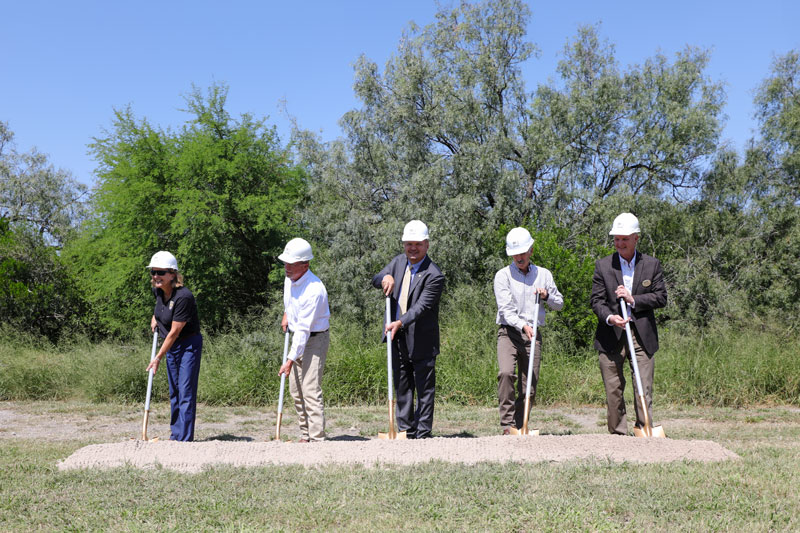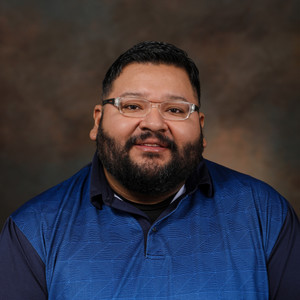KINGSVILLE (Oct. 9, 2024) — In what is seen as a major step in sustaining the legacy of the United States ocelot, the Caesar Kleberg Wildlife Research Institute (CKWRI) at Texas A&M University-Kingsville broke ground on an Ocelot Conservation Facility on Wednesday afternoon at the Caesar Kleberg Wildlife Center.
The $20 million facility will be a state-of-the-art complex that offers nearly 30,000 square feet of dedicated space for ocelots and will be dedicated to the advancement of ocelot research with the mission of understanding the intricacies of ocelot behavior and health.
“We’ve been working at this lone project for at least 18 months, but really it’s four decades of work that has gotten us to a point of recognizing the need for this facility,” said Dr. David Hewitt, Leroy G. Denman, Jr. Endowed Director of Wildlife Research for the Caesar Kleberg Wildlife Research Institute. “Then to find the resources from the university and other partners to put this together has us really excited about all this coming together. The fact that there are people across South Texas, the university and elsewhere that are excited about wildlife is our big motivation. There’s a lot of conservation values in this for the ocelots, but we’re excited about the opportunities this is going to bring for graduate student education and undergraduate experience you can’t get anywhere in the country.”
The facility project is the culmination of research conducted in collaboration with the university, the East Foundation, United States Fish and Wildlife Services and private landowners that has been pivotal in providing insight and details surrounding the lives of ocelots in Texas and has increased awareness of their conservation status.
“This says that there are foundations and government agencies that have a lot of confidence in our researchers and what we’re doing around conservation,” Texas A&M-Kingsville president Dr. Robert Vela Jr. said. “This facility validates to this community that we have something special at this university that really understands what it is to conserve, what it is to ensure that we take a lot of pride in our habitats, environment and our species.”
“When you look at the federal government, private landowners, the East Foundation and others, we all share similar values — we all care about South Texas and we all value what it brings to our communities,” Vela added. “When we can unite with similar values and similar missions, we can do something really special. If we can partner and come together, this is an example of the community. You’ve got the Foundation, CKWRI, Texas A&M-Kingsville and the King Ranch all working together to make this happen.”
The facility will be the first in the nation dedicated to housing ocelots for breeding purposes, while providing medical and reproductive care, and an environment for young ocelots to learn hunting skills and other natural behaviors that will prepare them for release into new habitats for ocelot restoration.
The primary research building will provide space for surgery, exams, offices, outreach, and education. There will be 16 ocelot enclosures that include separate spaces offering interior and exterior holding areas. Enclosures will be dedicated to breeding female and male ocelots, new mothers with offspring during the first weeks of life, and ocelots being quarantined.
Assisting with the breeding efforts will be the East Foundation in collaboration with the Cincinnati Zoo and reproductive specialists from across the country. With the only remaining wild ocelots residing in Texas and with only 100 known to be in the wild throughout the South Texas region, the CKWRI and specialists will look to increase the population.
They will work with zoo ocelots and use semen collected from wild ocelots to inseminate females, creating ocelots with regional genetics that will thrive in South Texas.
“It took getting many groups in one room for the same purpose,” said East Foundation research veterinarian Dr. Ashley Reeves. “Those collaborations continuing will be integral to breeding these cats and having expertise in mating them, introducing them and teaching these kittens how to hunt. We will need to continue to have these collaborations to make this a success.”
The rewilding hub will provide 4 ¼ acre pens dedicated to mothers and offspring to develop hunting skills and other wild behaviors while their health is monitored in preparation for movement to pre-release pens in the field. All spaces have been carefully designed with the animals’ well-being and safety as the highest priority.
The facility will also provide a secure and safe location to quarantine ocelots that have been received/translocated from other facilities or sites while also supporting a sustainable plan for recovering ocelots through reintroduction.
Construction will begin this month and is expected to be completed in December 2025.
-TAMUK-

